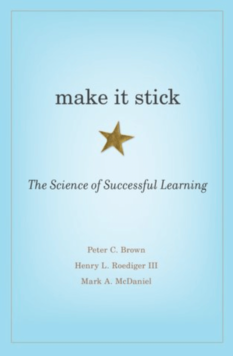💡 3-Sentence-Summary
The research group around neuroscientist Henry Roediger and psychologist Mark McDaniel spent ten years exploring learning strategies. ‘Make it Stick’ summarizes six evidence-based, application-ready strategies that help you learn better and store new knowledge in your long-term memory. The six strategies include retrieval practice (recall something you’ve learned in the past from your memory), spaced repetition (repeat the same piece of information across increasing intervals), interleaving (alternating before each practice is complete), elaboration (rephrasing new knowledge and connecting it with existing insights), reflection (synthesize, abstract, and articulate key lessons taught by experience), self-testing & calibration (answer a question or solve a problem before looking at the answer and identify knowledge gaps).
💭 What I think about it
Because of its applicability, this is my favorite book on evidence-based learning. You’ll realize the factors that shape your intellectual ability lie to a surprising extent within your own control. After reading, you’ll understand how to make the best learning techniques work for you.
🌟 Who benefits from reading this book?
This book is for anyone who wants to become a better learner.
📚 How the book changed my life
This book helped me understand fundamental truths about learning: Here are some powerful concepts from the book explores:
- Your brain’s capacity is unlimited. Contrary to common belief, our brains are never full. The more we learn, the more we can remember. Learning is a virtuous circle. The more cues we have, the easier it is to encode new information to these cues. As long as you connect further information to existing brain branches, you can store much more than you think.
- To learn, you first need to forget. I always thought forgetting is a character’s flaw. But it isn’t. Forgetting is necessary for new learning. That’s why spaced repetition is among the most effective learning strategies. You allow forgetting to occur and thereby strengthen your memory.
- The power of reflection. Reflecting leads to stronger learning. To reflect, you need to retrieve, connect, and visualize earlier memories. Often, you mentally practice what you’d do the next time differently. That’s why regular thinking breaks are so valuable.
✍️ My Favorite Quotes
- Mastery, especially of complex ideas, skills, and processes, is a quest. Don’t assume you’re doing something wrong if learning feels hard.
- Trying to solve a problem before being taught the solution leads to better learning, even when errors are made in the attempt.
- Many teachers believe that if they can make learning easier and faster, the learning will be better. Much research turns this belief on its head: when learning is harder, it’s stronger and lasts longer.
- Rereading has three strikes against it. It is time-consuming. It doesn’t result in durable memory. And it often involves a kind of unwitting self-deception, as growing familiarity with the text comes to feel like mastery of the content. The hours immersed in rereading can seem like due diligence, but the amount of study time is no measure of mastery.
- It’s not just what you know, but how you practice what you know that determines how well the learning serves you later.
- Learning is deeper and more durable when it’s effortful. Learning that’s easy is like writing in sand, here today and gone tomorrow.
